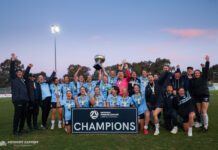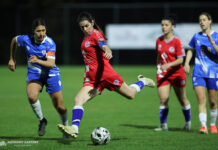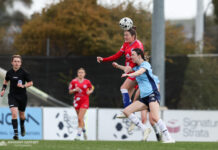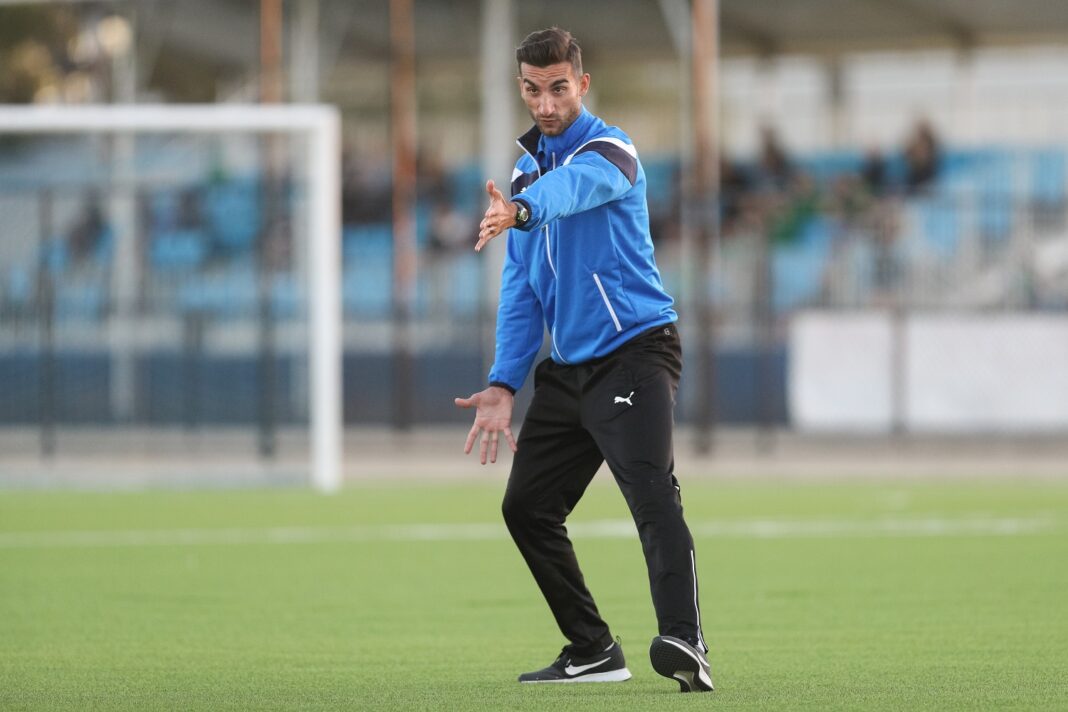
Football SA NTC head coach and Adelaide United assistant Michele Lastella gave Beyond 90’s Ben Gilby an insight into the state’s NTC program, and how a joined-up way of thinking which links the SA NTC directly with Adelaide United is leading to the successful development of girls and women’s football in South Australia.
“Like women’s football in general, the women’s NTC program continues to progress. Football South Australia has had a number of quality coaches through the program such as Ross Aloisi, Paul Pezos, Michael Matricciani who have all gone on with their coaching careers,” said Lastella.
“When I first came on board back in 2017 as Michael Matricciani’s assistant, we were competing in two leagues, boys’ under 14 competition as well as the women’s state league. That year, we earned promotion and have had a bit of a roller coaster ride in the WNPL, finishing fourth in 2018, eighth in 2019 and fifth in 2020.
“I feel the journey of the women’s SA NTC squad has been a positive one, where I always praise past players who have essentially paved the way for our current crop of players. It is important for my players to acknowledge that all ex-NTC players leave some sort of legacy and did not have the access to the facilities and resources we have now.”
“The evolution of the FSA NTC Women’s program continues to grow with the introduction of a Women’s Technical Director in Cristiano Dos Santos who is doing a great job of pushing the women’s game at a grassroots and elite level.
“In terms of my own background, my undergraduate was Bachelor of Psychology and I have a PhD in Psychology where my main research focus is on sleep/wake behaviour and sports psychology in elite athletes.”
Michele outlined the eligibility criteria in selecting players for the NTC squad. “Traditionally, there have been some restrictions related to having older players in the NTC program purely to align with the NTC Challenge. However, recently Football Australia has encouraged national training centres across the country to potentially increase the age of some players in an attempt to minimise the gap between the NTC squads and W-League squads.
“From this perspective, I work closely with Adelaide United Head Coach Adrian Stenta to discuss who may potentially benefit from staying an additional year in the program. From what I know, Football Victoria has reshaped their model toward an Emerging Victoria program such that they have older players in their program and minimising this gap.
“The SA NTC squad has a strong group of coaches working with them. I am head coach, I have two assistant coaches, Mark Lobianco and Michael Moularas. Our goalkeeper coach is Nathan Tripodi, with Adelaide United’s W-League goalkeeping coach Anthony Breaden also on board. We have Strength & Conditioning with Victor Thach, Jason Collins as Physiotherapist, Team Manager Sharee McNamara and Technical Director Cristiano Dos Santos.”
In terms of the status and strength of the SA NPLW, Michele states, “The only real way to objectively assess the standard is for the best two teams to play against the best two teams of each state. Perhaps an annual tournament consisting of two top teams from each state will indicate which teams are the best. The other potential way is to calculate the quantity of W-League players playing in the WNPL.”

“I truly hope the W-League becomes a fully professional league where players are competing for nine to ten months of the year instead of three months. Long term this will benefit the national team set-up. While the standard of the WNPL in SA has suffered somewhat this season as a number of Adelaide United players have been offered opportunities interstate and internationally, what we have observed is that this has levelled out the competition with all teams capable of beating each other. In the past, this has been dominated by the teams with the most W-League players.”
It’s been another encouraging season for the SA NTC side as they have been challenging for a top four spot all campaign. As the action moves into the final few games of the regular season, Michele assessed how things have gone.
“We had a positive start to the season, but as long as we are moving forward in terms of our style of play then I am happy. Examining our progress is somewhat complex, but as a quick overview I tend to look at our positioning in the main moments of the game, so where are my players according to when we have the ball, what area we have the ball, and the movements off the ball.
“On the flip side, when we don’t have the ball, where are my players positioned? Or perhaps even more important, what is the response when we lose the ball? In short, it is important to emphasise the performance, how we play, are we keeping the ball, are we adapting to the environment, etc.
“I am a big believer if you focus on these aspects of the performance, not the result, then you can actually impact improvement. I also look at player development, for example, position-specific. Are my wingers looking at the position of the fullback before they make a run, or are they supporting our midfielders when under pressure, etc. This can be quite extensive.”
Michele places a major emphasis on the importance of everyone moving together as a team to ensure an effective group. “There are a few key principles of team culture that I stress, some of which I have learned through my studies, some of which I have observed, and some I have learned through reading.
“To be completely transparent, a lot of these principles I have adapted from the cultural influence of the New Zealand All Blacks Rugby Team. After reading the book ‘Legacy’ by James Kerr, I felt so strongly about the principles that I absorbed them into my everyday life.
“One of the major things I have instilled is a real collectivist approach to the being of team. Everyone moving in the same direction, everyone does everything together, specifically, no one is bigger than the team.
“For example, something I observed from the Japanese Olympic team some years ago was that when they would move a goal at training, all 22 players would physically pick up the goal altogether, not six players, but every single player. So, I have always taken that with me everywhere I go. This is somewhat similar to the All Blacks principle of ‘following the spearhead’ such that in order for a spear to be effective its force must move in one direction. The minute you have players wanting to do their own thing, the power of your team is diminished.”
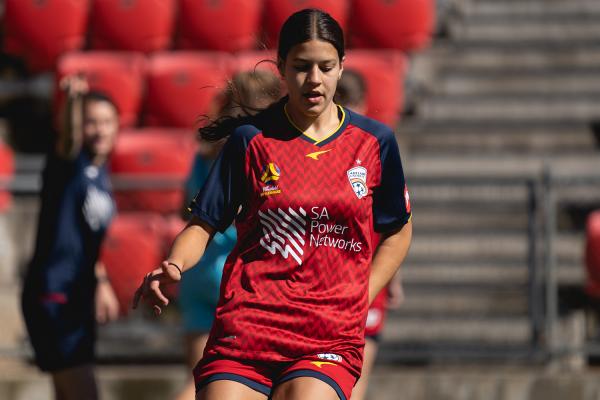
“Take pressing, for example, if my team doesn’t press together as a unit, teams will play through you. In contrast, if we press collectively and aggressively, then it makes it very difficult to play around.
“The idea of humility, that is, never be too big to do the small things, the “sweep the sheds principle” of the All-Blacks, I try and stress to the girls, that they should never forget where you come from, never forget all the effort your parents, families, friends, guardians have done for them. Being humble, and looking after themselves and their teammates so that no one else has to do it.
“Finally, something that I feel has been extremely helpful, and proven within sports psychology realm is the idea of value-driven behaviours. Keeping the attention on what our agreed-upon values of a team are, at the beginning of the season, we had a number of meetings about what our values are both individually and collectively. This is something we did as a team, and I always make sure I address these values. If our behaviours are matching our values then we can be proud. Some of these values were respect, humility, teamwork, hard work, professionalism and resilience. This is also another tool I use to assess our success, if we are working as a unit, if we are respectful, humble, hardworking, professional and resilient in times of adversity then we are living by our values.”
The development of young players is such a key element of the WNPL and the NTC plays a major part in this. Michele outlined the selection processes that he uses to draw young players from as widely across the state as possible.
“The development of young players is essential to the sustainability of our program and also the WNPL. After all, the majority of our players will go on to play for a WNPL club.
“Our selection process is somewhat varied, each year we typically have a carnival for players around the state that we potentially can bring in to have a closer look. We have players from regional areas come in for regional camps as well as track players across the WNPL and reserve competitions to assess their progress. At the end of each season, we look at players from the age groups underneath us, from across the league and regional areas.”
The program has two key goals. “Develop the person and develop the player. Ultimately, our job is to develop and produce players to be ready for both youth international football and the W-League.
“Last season, we had three of our girls earn either full contract or scholarship contracts with Adelaide United. Recently, we have had three players, Ella Tonkin, Abbey Burns and Milsy Murray called up to a Young Matildas selection camp ahead of the Asian Cup qualifiers.
“Approximately three quarters of the Adelaide United W-League squad have been part of our program at some point in their development. We truly hope this continues, and we want to see more ex-NTC players like Charli Grant and Dylan Holmes go on to represent the Matildas.”
“Once the COVID situation calms down, I would love to take our girls away for an international tournament, to either Japan or Europe, we competed in the Saitama International Football Festival in 2018, and I felt the girls benefited so much from seeing Japanese football culture. I am a big fan of Japanese culture as well as the technical ability of Japanese players.”
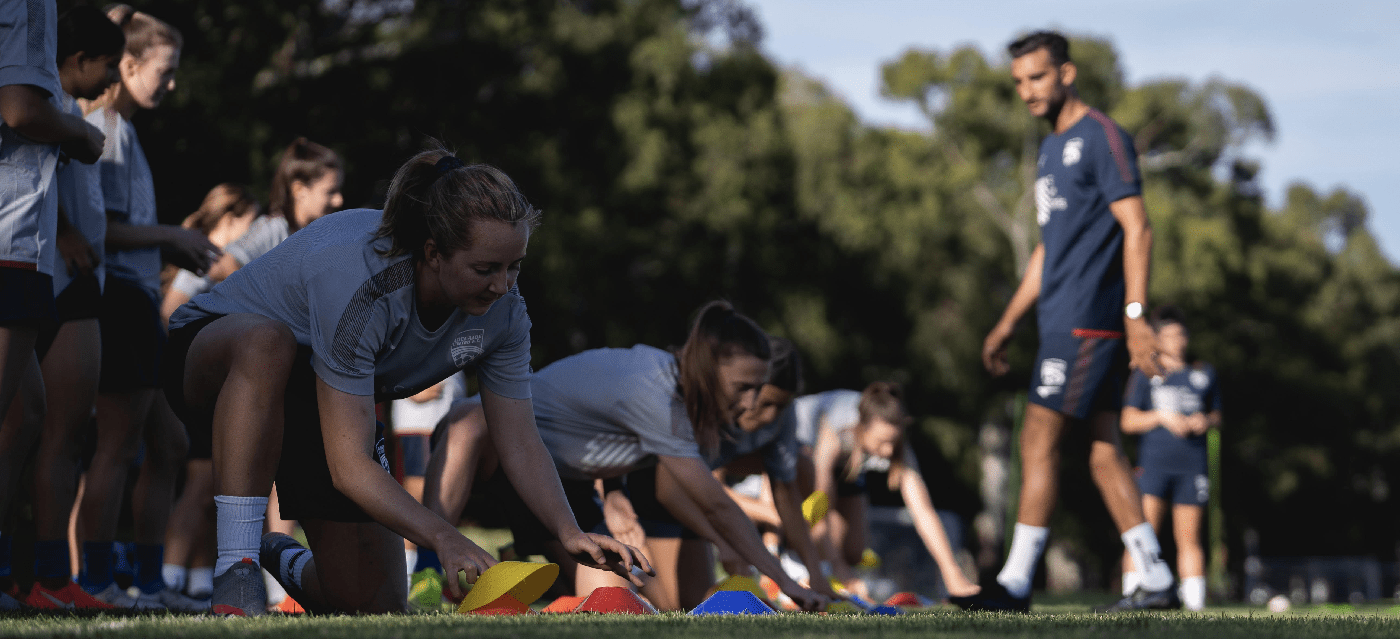
Michele concluded our conversation by highlighting how he works with the state’s W-League club.
“The relationship between Football South Australia and Adelaide United Football Club continues to build. The previous Director of Football, Ivan Karlovic, brought me in as an assistant two years ago and felt that it was a necessary step to try and bridge the gap between our NTC Squad and Adelaide United W-League squad.
“I feel this was an important step, now as an assistant to Adrian Stenta we are able to communicate and plan regularly what the future may hold. It is important to note that players do develop at different rates for various reasons, physically, psychologically etc. so while I tend to look at football intelligence first, players entering or potentially entering the W-League environment need to be ready physically and psychologically.
“The challenge from an Adelaide United perspective is that we had such a good season last year, bigger states, bigger clubs as well as international clubs are approaching our players which is the nature of football. On one hand, this is a compliment, on the other, it can hurt the momentum we built last season.”


